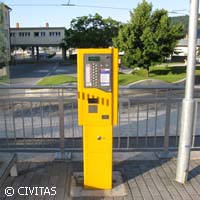Brno upgrades public transport ticketing system with EU-funded tool
Travelling by public transport in Brno, the second largest city in the Czech Republic, is now a quick and efficient process thanks to the introduction of a new system of ticket vending machines this summer. The innovative system is an outcome of the CIVITAS ELAN ('Mobilising citizens for vital cities Ljubljana, Gent, Zagreb, Brno, Porto') project, which received almost EUR 18 million under the 'Sustainable surface transport' (SST) Theme of the EU's Seventh Framework Programme (FP7). The work was carried out as part of the CIVITAS-ELAN project in which the mayors of the cities of Brno, Ljubljana in Slovenia, Gent in Belgium, Zagreb in Croatia, and Porto in Portugal agreed a common mission statement to 'mobilise our citizens by developing with their support clean mobility solutions for vital cities, ensuring health and access for all'. The five cities decided to put this statement into action on the basis of a clear set of common objectives, based on the principle of putting the citizen first. For each of the CIVITAS policy fields a common set of objectives and project goals has been agreed and the cities have developed a programme of 69 measures. At the end of July 2010, two months ahead of schedule, the Brno Public Transport Company (DPMB) finished installing a new system of ticket vending machines in the city that officials claim has improved the quality of the service for all public transport users. Brno has a population of nearly 370,000 people and is an important tourist centre for those wanting to visit or use the city as a starting point to explore the natural and cultural beauties of the South-Moravian region. Because the public transport system is used heavily, an efficient service should be available. To bring the machines up-to-date, officials added the diagnostic system to all 153 ticket vendors in the city. This means that any problem relating to the machines is relayed directly to DPMB, allowing the company to rectify the situation immediately. The system is based on the transfer of data between ticket vending machines and the control centre using wireless general packet radio service (GPRS) technology. In the control centre, the data is displayed on the computers with special software. The ticket vending machines are equipped with modules that include communication modems; they communicate with all parts of the vending machine and collect data that are sent on-line to the control centre for further analysis. Detailed information about a problem is included in the message from the ticket vending machines. The operator in the control centre interprets the received data and acts to immediately send a serviceman to resolve the issue. During the pilot project, only 10 ticket vending machines were equipped with the system, which was not attended for 24 hours a day. The operator read messages only between the working hours of 6am to 2pm; the average time necessary to eliminate a fault was already about six hours less than before the introduction of the system. This proves how much more efficient the system is now that all machines are equipped with the new technology. Experts from Austria, Belgium, Croatia, the Czech Republic, Germany, Portugal and Slovenia participated in the EU project.
Countries
Austria, Belgium, Czechia, Germany, Croatia, Portugal, Slovenia



